Korea prepared for U.S. rate hike
Central bank holds key rate steady at 1.5%
By 정주원Published : Dec. 10, 2015 - 18:30
The looming monetary tightening in the U.S. is unlikely to have a major immediate impact on Korea, Bank of Korea Gov. Lee Ju-yeol said Thursday, as the central bank held its key rate steady at a record low level.
“The (BOK’s) Monetary Policy Board reached a consensus on a rate freeze, with signs of ailing domestic demand, expectations of a U.S. rate hike and other related global uncertainties,” Lee said in a press briefing at the bank’s headquarters in central Seoul.
“The (BOK’s) Monetary Policy Board reached a consensus on a rate freeze, with signs of ailing domestic demand, expectations of a U.S. rate hike and other related global uncertainties,” Lee said in a press briefing at the bank’s headquarters in central Seoul.

With the rate freeze, which was widely expected, Korea’s key borrowing rate stays at 1.5 percent until January. This is the sixth time that the central bank has frozen the rate since June, when it announced a surprise cut of 0.25 basis points, citing the need to boost domestic consumption after the outbreak of Middle East respiratory syndrome here.
The move comes as global markets await the decision day, Dec. 16, when the U.S. Federal Reserve meets to review its borrowing rates. It is almost certain that the world’s largest economy will start raising interest rates, finally exiting the quantitative easing that has defined its response to the financial crisis.
“We expect that the U.S. rate hike will be carried out at a slow pace, and is more likely to have a minor impact on (Korean) financial markets,” Lee said.
The U.S. rate hike scenario has been expected for a while, giving authorities enough time to digest, Lee continued, adding that Korea had a contingency plan, which he refused to elaborate on.
The governor viewed that Korea was expected to continue its recovery, led by consumption-inducing policies, such as the “Korea Black Friday” promotion and tax cuts. Retail sales jumped 3.1 percent in October from a month before.
Facility investment and construction investment respectively fell 0.8 percent and 7.8 percent from a month earlier.
Exports, which stood at $44.4 billion in November, fell 4.7 percent from a month ago on China’s economic slowdown. The BOK governor expected that Korean exports would not recover quickly.
Regarding the weak Chinese renminbi, now the fifth currency of the International Monetary Fund’s special drawing rights basket, Lee said whether the yuan currency would continue to stay weak is a contentious issue. If China succeeds in its ongoing financial reform moves, and with the Korea-China free trade agreement expected to take effect this month, a weak yuan will have limited repercussions on the Korean economy, he added.
Regarding concerns that the government’s one-time consumption-boosting measures may trigger a consumption cliff next year, Lee said the chances of this were slim, citing improvement in the average purchasing power caused by by steady wage growth and low oil prices.
Meanwhile, Lee acknowledged that the government required speedy action to control the country’s snowballing household debt.
“Household debt has grown fast, partly caused by an (eased) LTV (loan-to-value ratio) and DTI (debt-to-income ratio) -- the comprehensive household debt control policies need speedy implement,” Lee said.
Lee also stressed that the economy should seek to raise the country’s future growth “potential rather than dependence on government policies.”
The BOK kept to its 3.2 percent growth outlook for 2016.
By Chung Joo-won (joowonc@heraldcorp.com)








![[Graphic News] More Koreans say they plan long-distance trips this year](http://res.heraldm.com/phpwas/restmb_idxmake.php?idx=644&simg=/content/image/2024/04/17/20240417050828_0.gif&u=)
![[KH Explains] Hyundai's full hybrid edge to pay off amid slow transition to pure EVs](http://res.heraldm.com/phpwas/restmb_idxmake.php?idx=644&simg=/content/image/2024/04/18/20240418050645_0.jpg&u=20240419100350)





![[From the Scene] Monks, Buddhists hail return of remains of Buddhas](http://res.heraldm.com/phpwas/restmb_idxmake.php?idx=652&simg=/content/image/2024/04/19/20240419050617_0.jpg&u=20240419175937)

![[KH Explains] Hyundai's full hybrid edge to pay off amid slow transition to pure EVs](http://res.heraldm.com/phpwas/restmb_idxmake.php?idx=652&simg=/content/image/2024/04/18/20240418050645_0.jpg&u=20240419100350)

![[Today’s K-pop] Illit drops debut single remix](http://res.heraldm.com/phpwas/restmb_idxmake.php?idx=642&simg=/content/image/2024/04/19/20240419050612_0.jpg&u=)